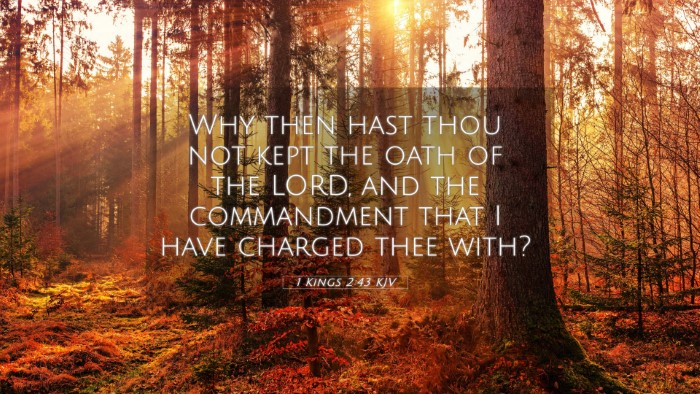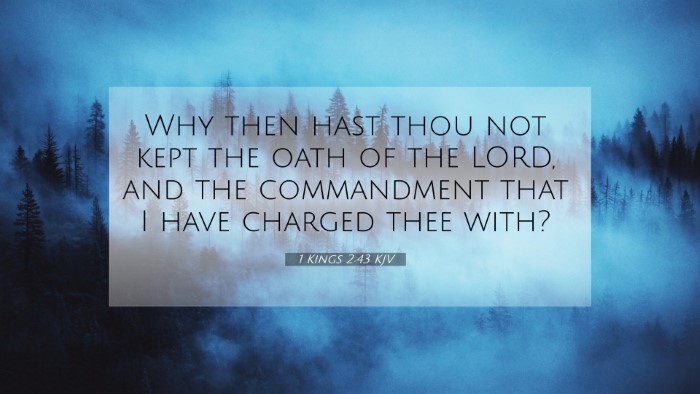Understanding 1 Kings 2:43
Verse: 1 Kings 2:43 - "Why then have you not kept your oath to the Lord and the commandment with which I charged you? The king said, ‘What then shall I do for you?’”
Summary of Meaning
This verse unfolds within the context of King Solomon's reign, highlighting the importance of loyalty and fidelity to obligations made before God. The themes of accountability and divine justice are prevalent, as they emphasize that actions must align with one's promises.
Insights from Public Domain Commentaries
-
Matthew Henry:
Henry emphasizes that this verse reflects the serious nature of vows made to God. He remarks that neglecting God's commands signifies disrespect towards divine authority and can lead to dire consequences. The verse serves as a reminder for leaders and individuals to uphold their commitments out of reverence for God.
-
Albert Barnes:
Barnes interprets the question posed by the king as a challenge for accountability. He notes that the oath represents a covenant—binding and sacred—between God and humanity. Failing to adhere to such promises indicates a breakdown in the relationship not only between individual and God but also among individuals in society, calling for introspection and a return to righteous conduct.
-
Adam Clarke:
Clarke explores the idea that the question posed by Solomon is both a rebuke and a call to action. The failure to keep an oath, particularly in a king's responsibility, shows serious implications for the entire nation. Clarke stresses the necessity of fulfilling one's obligations, particularly in leadership, where the impacts are felt broadly across society.
Key Themes
- Accountability to God
- The importance of keeping one's word
- Consequences of neglecting divine commands
- Leadership and responsibility
Cross-References for 1 Kings 2:43
Understanding 1 Kings 2:43 can be enriched through various related scriptures, which enhance biblical themes revolving around commitments and divine expectations. Here are notable cross-references:
- Psalms 15:4: Highlights the importance of keeping oaths even when it is inconvenient.
- Ecclesiastes 5:4-5: Warns against making vows before God lightly, emphasizing their serious nature.
- 1 Samuel 15:22: Illustrates that obedience is more valued by God than sacrifices, linking obedience directly to fulfilling promises.
- Jeremiah 34:18: Discusses the importance of keeping covenantal commitments and the consequences of forsaking them.
- Matthew 5:33-37: Jesus’ teachings on oaths reinforce the call for integrity and truthfulness in word and deed.
- Romans 12:1: Encourages believers to present their lives as living sacrifices, tying back to the essence of commitment to God.
- Hebrews 6:16: Explains the importance of God's promises and how they serve as a foundation for faith and conduct among believers.
- Lamentations 3:34-36: Frames God's justice in terms of upholding commitments, again reinforcing the importance of promises made.
- Numbers 30:2: Outlines the laws regarding vows, emphasizing the necessity of following through on commitments.
- Proverbs 20:25: Advises on the carefulness needed when making promises, illustrating the weight such declarations bear.
Connections Between Bible Verses
The reflections on 1 Kings 2:43 lead to numerous connections with other scriptures that explore the consequences of failing to keep one’s word. By examining these verses, one can identify the overarching biblical theme of responsibility before God and the weight of our vows.
Thematic Bible Verse Connections
Through thematic connections, one can also explore:
- Faithfulness: Reflected in the character of God and the expectations laid on His followers.
- Consequences of Actions: How negligence of divine law can lead to disaster both personally and collectively.
- Leadership Integrity: The influence of promises made by leaders and their far-reaching effects.
Bible Study Tools and Resources
For those looking to delve deeper into cross-referencing biblical texts and understanding connections between Bible verses, consider utilizing tools such as:
- Bible concordances
- Bible cross-reference guides
- Cross-reference study methods
- Comprehensive Bible cross-reference materials
How to Use Bible Cross-References
Utilizing Bible cross-references can enhance your understanding of 1 Kings 2:43. Here are some methods:
- Identify keywords within the verse and search for similar themes throughout the scripture.
- Compare God’s expectations with those outlined in the New Testament for a comprehensive view.
- Engage in reflective prayer and meditation on these verses to discern their impact personally and collectively.
Conclusion
1 Kings 2:43 serves as a potent reminder of the weight of our promises before God. By examining the insights gathered from historical commentaries and the interconnectedness of related scriptures, readers can gain a rounded perspective of their obligations as believers. The emphasis on integrity, accountability, and divine expectations remains a resonant theme throughout the entirety of scripture.







